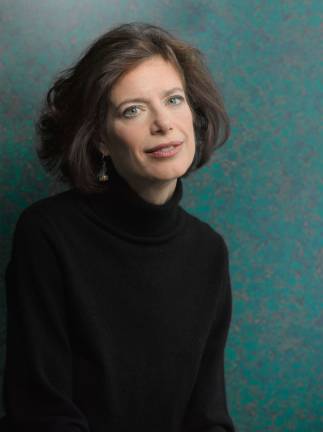Feminist writer Susan Faludi to discuss father's gender change



By Marilyn Rosenthal
MILFORD — Imagine being a well-known feminist writer who rebelled against an abusive, sometimes violent macho father from whom she had been estranged for decades. Then imagine suddenly receiving an email from him saying, “I have decided that I have had enough of impersonating a macho aggressive man that I have never been inside.”
This is the way Faludi found out about her father’s gender reassignment surgery, when he was 76 years old. It's also the subject of her well-known book, "In the Darkroom," a Pulitzer Prize finalist and winner of the 2016 Kirkus Prize for non-fiction.
Faludi will be discussing this and the nature of gender and identity at the Milford Readers and Writers Festival at 10 a.m. on Saturday, Sept. 29, in conversation with Carol Jenkins, an Emmy-winning anchor and former correspondent for NBC- TV.
Faludi sees gender as being on a spectrum, and much more complicated than society’s expectations are. Her father’s transformation to transgender woman was an epiphany for her as both as a daughter and as a feminist writer and journalist. Faludi won a Pulitzer for Explanatory Journalism for a Wall Street Journal series about the social and human costs of the leveraged buyout of Safeway Stores.
She approached her father’s transformation with the same journalistic investigative skills, but she was also learning much more about herself and her family. She visited her father in Hungary to try to understand how Steven Faludi, the man who had abused and abandoned her family, became Stephánie Faludi. Steven Faludi was a Holocaust survivor who, as István Friedman, escaped Nazism in Hungary.
Susan believes identity is somewhat shaped by external connections. She believes the psychic disturbance of the Holocaust had some influence on her father, but certainly not totally.
“It helps that I am a woman," Stephánie told her daughter. "I am accepted better now as a woman than I ever was as a man.”
June Cleaver, or Marilyn Monroe?At first, Stephánie approached being a woman with the same traditional view that she had lived as a macho man. She went through a Doris Day stage, a June Cleaver stage, and even flouncy Marilyn Monroe stage. But all that had mellowed into the older transgender woman she later became.
Susan was finally able to make peace with Stephi, who died in 2015. She writes about her father as “she” after the transformation, and as "he” before that time. It’s interesting that in Hungarian there are no pronouns distinguishing “he” from “she."
Susan Faludi’s writing of her experience of discovery is beautiful, moving, and courageous. To get a fuller picture of how she looks at gender and identity, it's also necessary to read her 1991 book "Backlash: The Undeclared War Against American Women." It won the National Book Critics Circle Award for general non-fiction and has become a classic feminist text. Feminists like Roxanne Gay and Jill Abramson applaud its relevance into the present day.
Faludi now teaches a course about women and journalism. She feels that younger feminists are fiercely fighting the good fight.
"In this era of Trump, women are keeping their eyes on the prize — to bring more woman into political office and to save their reproductive rights, among other issues," Faludi said.
In earlier days, the focus was on self-expression through personal identity and personal choice. Now, she says, "It’s time for women to set up their own thing and not have to go through the male assignment gate.”
For more about the Gender Identity panel and other events at the festival, visit milfordreadersandwriters.com.
Related stories "Vietnam chronicler Frances FitzGerald to talk about writing in a man's world": https://bit.ly/2PPdQnV
"Meet Jane Friedman, Queen of the Backlist": https://bit.ly/2wyziF7